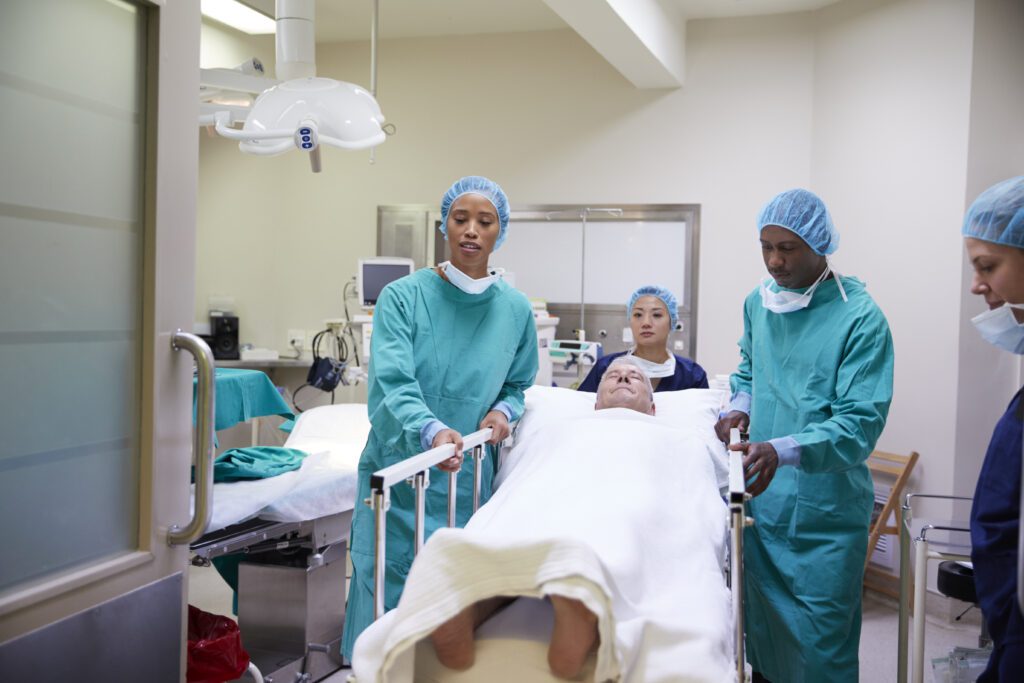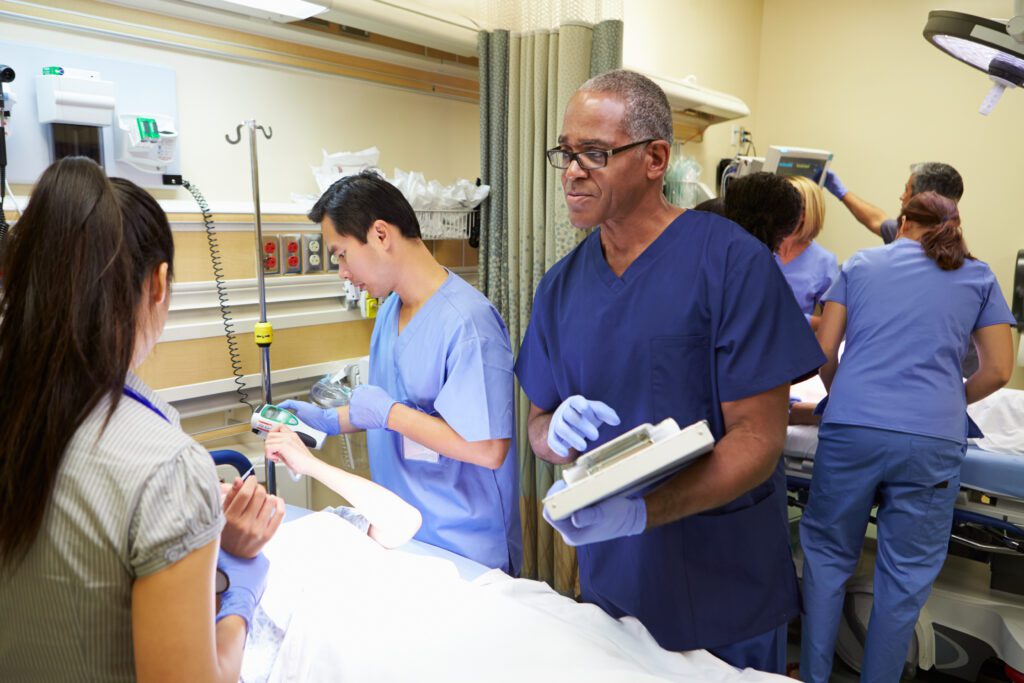Some of the links on this site are affiliate links. This means that if you click on the link and purchase an item, I may receive a small commission at no extra cost to you. I only recommend products and services that I personally use, trust, or believe will provide value.

How I Ended Up in the Wonderful World of Ambulatory Surgery Nursing
So, I’ve been an RN mostly working in an Ambulatory Surgery Center (ASC)—mainly in PACU, occasionally helping in Pre-Op when they’re short staffed. And let me just tell you, I’m seriously thanking my lucky stars I stumbled into this area of nursing. Because if I were still doing inpatient nursing in med-surg, stepdown, or ICU… I don’t think I would’ve made it.
I came into this from full-on burnout after almost five years in inpatient nursing at a county hospital. Read: My personal story here. I started in med-surg/tele, then oncology, then moved up to stepdown and finally ICU. And mind you, this ICU wasn’t even wild—we had 18 beds, and the really sick ones got transferred to the bigger county hospital. But even then, the job was so mentally and physically exhausting that it eventually took a toll on my mental health… and my marriage.
I quit the job out of nowhere. No plan, just vibes. Took a six-month break from nursing. Thankfully, I had a decent sense of financial wisdom early in my career and managed to build a solid emergency fund in my Ally HYSA. After a few months of “funemployment,” that career crisis fund started running low, so I applied to an outpatient primary care clinic.
Update (9/2025): Since my HYSA rate from my Ally account and other online banks I’ve researched is now lower than the rate on my SoFi Checking and Savings account, I’ve started rerouting my emergency fund into my SoFi account. I simply move my money where it can earn more.
As of: 9/26/25: with Sofi Online savings account you can earn up to 4.50% APY for 6 mos. See complete terms at : SoFi.com

I lasted two weeks. Honestly, it was even harder. Maybe it was just me, but the MAs seemed ready to eat me alive. Straight-up hostile. I don’t know what it was about that unit, but it gave off serious “we hate RNs here” energy. I left before even finishing orientation.
After walking away from that failed attempt, reality set in. I needed something stable again, so I started sending out job applications everywhere, even to units I knew I’d hate (hello again, med-surg). I was getting a little desperate, not gonna lie. I even applied to an ICU job I swore I’d never go back to. I was on my way to an interview for a stepdown unit when a unit manager from an ASC called and asked if I could come in for an informal interview. I was literally in the parking lot, and the ASC happened to be on the way, so I said, “Sure.”
Best random decision I’ve ever made.
I did the interview and got offered the position right then and there. I didn’t know it at the time, but apparently it’s hard to get into this healthcare system—and even harder to get into that particular unit because of union seniority rules and the fact that people just don’t leave. Like, ever. It’s the kind of place nurses retire from.
Fast-forward eight years, and here I am: PACU nurse (sometimes Pre-Op), ASC life. Most days, the work is definitely better than inpatient. My anxiety and stress level from work is basically zero. I even stopped taking medication to sleep. (True story.) Sure, it can be fast-paced and chaotic, but it’s still way better than running around the floor trying to look like you’re not dying.
Typical Day as a PACU Nurse in the ASC

I usually start on Tuesdays because I’m a Per Diem Nurse and I hate Mondays. (Most ASCs are Monday to Friday, closed on holidays, no overnights.)
I clock in at 8 a.m., check in with my lovely charge nurse, and see if I’m in Pre-Op or PACU. I’m usually assigned to PACU. Since I’m per diem, I don’t have a permanent spot—unlike full-time nurses who show up every day. I save two patient pods side by side, and that’s my territory for the shift.
First order of business: set up for the day. I make sure I’ve got:
- Oxygen masks
- Nasal cannulas
- “Christmas tree” for the oxygen
- Suction setup
- Gauze and tape for heplocks
- Thermometer
I log into the computer, check the OR board, and try to guess if the day’s gonna be easy or one of those “why did I come to work” days. It really depends on the number and type of cases. Here’s my unscientific breakdown:
Easy PACU Recoveries:
Cataracts: Fast-track, no sedation, sometimes not even NPO. Easiest patients ever.
Hand Surgeries: Carpal tunnel, trigger finger, ganglion cysts, etc. Usually local anesthesia, maybe a little fentanyl. Awake and ready to go in under an hour. Some even go back to work the same day.
Pain Management Cases: We do a lot—lumbar/cervical epidurals, ketamine infusions, radiofrequency ablations. Some get sedation, some don’t. They nap, they wake up, they go home.
Harder PACU Recoveries:
Peds (Circumcisions and minor pediatric urology cases): Babies cry when they wake up and can’t tell you what’s wrong. I thought I would get better when I became a mom, nope didnt help. Still not a peds nurse at heart. Most parents are fine, but sometimes they panic like their kid’s head fell off.
Other Peds Surgeries (2–12 y/o): Tonsils, adenoids, myringotomies. Often worse than infants. Screaming, refusing meds or popsicles. Also, I don’t like giving narcotics to kids.
Ortho Cases: Knees, shoulders, elbows. If the nerve block works, great. If not, it’s Dilaudid and Fentanyl until their pain is under control.
ENT/Nose Surgeries: Septoplasty, turbinate reduction, sinus surgery. Common issues: headache, nausea, bloody noses. We apply a “moustache dressing” and an ice pack, and wait it out.
Urology: Cystoscopy, stents, vasectomy, testicular biopsy. Usually easy. Some go home with a Foley catheter, others just need to void before discharge.
Abdominal Surgeries (Lap chole, inguinal hernias): 80% recover well. Some need minimal extra meds. Patients over 50 usually must urinate before discharge.
Breast Cases (biopsies, lumpectomies, excisions): Usually general anesthesia. Some go home with JP drains. Mild to moderate pain/nausea common. Often need extra time in the recovery room.
In PACU, we monitor vitals every 15 minutes for at least an hour. Once patients are awake, tolerating PO (juice/crackers), and symptoms managed—they’re good to go.
Common meds: Dilaudid 0.6–1 mg, Fentanyl 50–100 mcg. Rarely need to call anesthesia for more.
Once in a while, we call 911 to transfer to ER— for uncontrolled BP or neuro symptoms etc. But it’s rare.
Surgeries wrap around 6 p.m. Most patients are discharged between 6:30–8 p.m. Then we close for the night.
Working in Pre-Op

Occasionally I cover in Pre-Op—either because we’re short or I’m helping out a co-worker cover their shift. Pre-Op moves fast. Lots of chart reviewing, patient interviewing, IV starts, and trying not to miss anything—while the OR team waits impatiently.
Each nurse gets 5–7 patients per 8-hour shift.
Before picking up a patient, I:
- Review history and comorbidities
- Scan meds (blood thinners, antibiotics, GLP-1s use)
- Check for recent ER/urgent care visits
- Confirm orders and consents
I also read the recent progress notes. One time I missed a note that a patient had been seen for possible scabies. PACU caught it post-op. Thankfully it was a false alarm, but it could’ve shut down the OR.
Supplies: gown, socks, head cover, warm blanket, vitals cart.
Pre-Op Routine:
- Start IV (usually 20g)
- Hang 1L LR
- Check blood sugar (for diabetics or pain management patients)
- Administer pre-op meds:Tylenol, Pepcid, Decadron, maybe Scop patch
- Document everything
Anesthesia and the surgeon will stop by to talk to the patient and mark the site. If all looks good, the OR team will pick up patient and move on to the next patient.
Random Pre-Op Things You Might Not Know:

- Peds: Must have an emergency weight-based dose sheet in chart at all times
- Nerve Blocks: Done at bedside while in Pre op. We set up and monitor, give Fentanyl/Versed per anesthesia
- Cataracts: Some are “fast track”—no NPO, just lots of eye drops
Pros & Cons of ASC Nursing
Pros:
- Most patients are ambulatory and relatively healthy
- Closed weekends, holidays, no nights
- Not in constant fight-or-flight mode
Cons:
- Can be hectic—7–8 admits/discharges in one shift
- Mostly 8-hour shifts (I prefer 10 or 12 hours shifts). I hate working Monday to Friday
- Sometimes Pre op is so fast paced, to the point that you get rushed by the OR team. It has something to do with how expensive OR time is. Its a whole different story and maybe a blog post in the future
- Your nursing skills will get rusty beyond inserting heplocks and nursing assessment skills.
But honestly? I’ll take it. It’s worth it.
Final Thoughts
If you’re looking for a fast-paced but manageable nursing job where most patients are stable and ambulatory, an Ambulatory Surgery Center might be a great fit. If you’re curious about how to become a PACU nurse, read my post: PACU Nursing: From a PACU Nurse.










